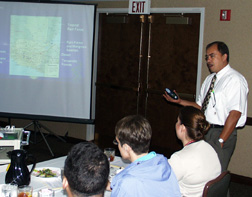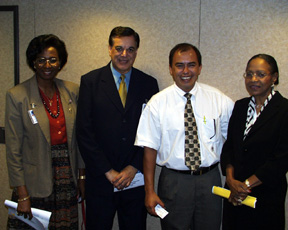 |
Jose Alfredo Garcia, M.D., shares information on his Medical Spanish/International Health Programs during a luncheon earlier this month at UNMC. |
What began as the dream of a medical researcher and physician in Guatemala City, Guatemala, has become one of the most successful Spanish immersion programs for American medical and health professions students. Moreover, UNMC’s enthusiastic response to the visionary Jose Alfredo Garcia, M.D., gave UNMC students priority placement in his Medical Spanish/International Health Programs (MS/IHP).
“From June 2001 through May 2002, 92 UNMC students participated in clinical or pre-clinical international medical/health experiences, ranging from one to four weeks long — 36 of those students went to Guatemala for Dr. Garcia’s programs,” said Sara Pirtle, coordinator of the UNMC’s International Students and Programs, who met Dr. Garcia through an Internet Web site.
The program
 |
From left, Rosaline Olade, Ph.D., associate professor,College of Nursing; Nizar Mamdani, director of NHS/UNMC Office of International Healthcare Services, Dr. Alfredo Garcia, and Auda Whitney-Jackson, UNMC community liaison. |
Phase II is for students who have a significant grasp of Spanish or who have completed Phase I. These students receive only one week of Spanish language review (individual instruction), again staying with families in Antigua, followed by three weeks of clinical work at San Lucas. Dr. Garcia also provides additional lectures and field trips to the clinical component.
UNMC students take part
During the 2000-01 academic year, there were three courses; followed by six in 2001-02 and nine by the end of 2002-03. From June 2000 to July 2002 there were 123 participants — 75 from UNMC and 48 from medical schools and residencies throughout the U.S. and Canada. UNMC students have first priority to fill the available slots, and any slots not taken are automatically filled from a waiting list of other American and Canadian med students. The 75 UNMC participants included 48 students from the College of Medicine, 15 from physician assistant education, five from College of Nursing, five from physical therapy education, one from the College of Pharmacy and one faculty member from the College of Nursing.
More on Guatemala
“Guatemala is about one-third the size of Nebraska, with 10 times the population,” Dr. Garcia said. “Our country is very accessible to the state of Nebraska. We’re in the same time zone and if you leave Omaha at 12:30, you’re in Guatemala by 7:30.”
Guatemala is geographically and ethnically diverse, Dr. Garcia said. The country borders the Pacific and Caribbean oceans, has 33 volcanoes and a mountain range as large as the Rocky Mountains in the middle of the country. It also has the largest indigenous population of any country in the Western hemisphere, he said, including 22 different ethnic groups, from the Mayan Indians of the mountain regions to more than 50,000 African-Guatemalans descended from slaves who escaped from plantations in neighboring countries.
Combinging language, culture, health care
American students take intensive one-on-one Spanish tutoring for six hours a day. Then they attend lectures and presentations by Dr. Garcia on Guatemala’s ecology, culture, history and politics. Medical lectures include such topics as “Poverty and Health Care,” “Guatemalan Health Care Delivery System,” “The Practice of Medicine in a Developing Society,” “Tropical Diseases,” and “Special Problems in Public Health.” Field trips include visits to Mayan ruins, volcanoes, Roosevelt Hospital at San Carlos University and rural health clinics.
“Our field trips cover a wide variety of geography and sociology in the country because I want students to see how we have diseases of scarcity and diseases of affluence,” Dr. Garcia said. “Students will experience patients with River Blindness and malaria. I’ve had fourth-year students deliver a baby — something they probably wouldn’t be allowed to do until their residency in the U.S. On the other hand, students will see that Guatemala also has diseases of prosperity, such as obesity, diabetes, cardiovascular disorders — there’s a lot of junk food available now.”
Program costs
Each MS/IHP course costs approximately $1,300. That includes four weeks of tuition for Spanish tutors and medical classes, housing and three meals a day from the host family, and all of the field trips except the one to the Mayan ruins. In addition, students must pay their own airfare, which runs approximately $600 to $700. UNMC medical students and PA students can receive credits for attending MS/IHP through their respective schools.
Pirtle: Programs fulfil a critical need
“Our courses have done very well for UNMC students — even students who came to Guatemala with no Spanish-speaking ability,” Dr. Garcia said. “After three weeks of one-to-one Spanish immersion, these students come back to America able to carry on a conversation and do medical intakes with Latino patients.”
“Dr. Garcia’s leadership and UNMC’s Medical Spanish/International Health Programs are fulfilling a critical need for training culturally competent Spanish-speaking medical and health professionals,” Pirtle said. “UNMC is truly a leader in the field for this type of programming because nothing else is available in the U.S. that offers this much value in terms of cost, personalized instruction, course length and the creative dedication of someone like Dr. Alfredo Garcia.”